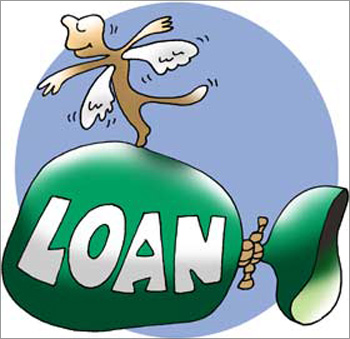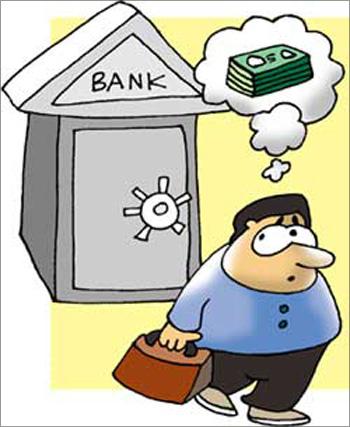
If you have been servicing debt, especially a home loan on a floating rate, you would already be having sleepless nights. Rising inflation in the past few months has already given legs to the thought that interest rates are likely to move up.
To make things worse, if you falter in regularly servicing debt going forward, it will be difficult to avail fresh lines of credit -- the process is likely to become more scientific. In fact, a major lacuna of the retail credit boom was that credit appraisal was not as scientific then as it is expected to become.
Against this backdrop, the New Year is certainly not going to be a happy one, especially if you have gotten used to living on credit. So, what should you do?
If you stick to some key principles, the going won't be too tough for you. It will, however, mean cutting down on expenses and living a more disciplined life, especially if you do not have much financial cushion after paying off your EMIs and dues at the end of the month. . . .

The Road Ahead
Inflation will be one of the biggest worries for policymakers in 2010. The recent spurt in food prices has forced the silent assassin to raise its head again. Already, there have been voices from different quarters that interest rates are expected to move up in the near future.
However, if you got your new house financed through any of the innovative home loans products launched in 2009, you should consider yourself lucky. A feature of most of these new home loan products is that the rate of interest is fixed till March 2012, which should save you from any nightmares due to a rise in interest rates in the short term.
On the other hand, if you took the loan on a floating rate, or if you are planning to go in for other credit lines, the sailing isn't going to be as smooth in 2010. However, in either case, you will need to manage your existing credit efficiently. And there are strong reasons to do so. . . .

Rising interest rates
Among all credit lines, it's the home loan on a floating rate that is affected most due to rising interest rates. Other loans like car and personal loans are usually of shorter duration, and available on a fixed rate too. The question is: if you have been servicing a home loan on a floating rate, and the interest rate on it goes up, what should you do?
When the interest rate on home loans rises, a lending institution typically does either of the following two things. If there is some cushion in terms of the debtor's working life, it increases the loan tenure, keeping the equated monthly instalment (EMI) same.
However, if the debtor's remaining working life does not look sufficiently long, the lender increases the EMI.
Which way should you go in such a situation? One way to reduce the rising burden of interest rates is to make additional payments towards principal repayment. Once the principal goes down, the loan tenure decreases, which reduces the cost on the loan. However, you will need sufficient funds in order to do this.
Lack of sufficient funds limits your options here. One way to dig for extra funds is to break investments where returns are lower than the effective rate on your home loan.
Cutting down on unnecessary expenses is another, and a more feasible one at that. However, if you have only a home loan, making extra payments towards principal repayment is the best option to reduce the burden of rising interest rates, given you have the necessary funds.
However, in case you have the necessary funds and you are servicing other lines of credit (such as credit cards and personal loans), attacking the home loan first is not the best option. . . .

Foreclosure route
Due to the tax breaks that come with a home loan, the effective rate you pay on it is one of the lowest among all credit lines. So, if you have extra funds at your disposal, there are other fronts you should target first.
Try to pay off the line of credit where you are paying the highest cost first. If you are revolving credit on your credit card, try and clear off its dues first: interest-on-roll-over-credit could be as high as 40 per cent in credit cards, and even higher in some cases.
The next credit line you should target is personal loan, where the rate of interest varies between 14 per cent and 20 per cent across institutions. Closing your auto loan is the next in the queue.
After repaying all other lines of credit, if you are left with some funds, try and clear your home loan. Remember, the effective rate of interest you pay on a home loan is much lower than what it costs you.
However, while foreclosing a line of credit (except in the case of credit cards), you should keep one thing in mind -- the pre-payment penalty.
In case of home loans and education loans, lenders usually do not levy a pre-payment penalty if funds from your own resources are used to foreclose the loan.
However, in other common lines of credit (auto and personal loans), the pre-payment penalty can be as high as 5 per cent of the outstanding principal. So, if you want to foreclose a credit line, check that the interest you save exceeds the pre-payment penalty. . . .

Scientific credit appraisal
Currently, if you approach a lending institution for a fresh line of credit, one of the first things it would do is run a check on your credit history with Credit Information Bureau (India), i.e., Cibil. If you do not have a good credit history, chances are high that it will not approve your application.
Says Harsh Roongta, CEO, ApnaPaisa, a comparison service provider: "The credit report from Cibil is used for refusing credit if you have a bad repayment track record." In most cases, it is used as a filter.
So, how will things change for you? Lending institutions have had access to your credit history since 2007. However, the difference is that now even you can access your credit information report (CIR) directly from Cibil on payment of a fee. Your credit report will provide you with a platform to work towards improving on it.
But why do you need to manage credit efficiently? Says Roongta: "Managing your credit will ensure that your financial life is well managed. You will be able to get essential loans such as education loans, home loans and car loans at a reasonable rate and at a faster speed."
Further, with the process of credit appraisal likely to become more scientific, a good credit history will ensure that you do not face any hurdles if you need fresh credit in future. . . .

The Actionables
Your CIR gives an idea of where you stand in terms of creditworthiness. You need to take some simple steps to improve on it.
Make regular payments: Ensure that you regularly service all your existing lines of credit. "Making your payments on time will have the most significant impact on your credit record," says Arun Thukral, managing director, Cibil.
But what should you do if you are unable to pay off your outstanding dues on time? After all, there are several factors (such as loss of a family member, sudden loss of job) which are not under our control, but affect our ability to service debt.
"In case you are in such a situation, the best solution for you would be to work it out with the lending institution," says Richard Fiddis, managing director (strategic markets), Experian, a credit information company.
Usually, if the bank or lending institution is convinced of your long-term interest to pay off the loan, it would be willing to work out a solution for you.
Reduce existing debt: If possible, try and reduce the quantum of your existing debt. "If your borrowings are significantly high, use some of your savings to repay some of your debt," says Thukral.
Reduce cost: The interest component in the EMI is the cost that you pay for taking the line of credit, especially in case of retail loans. One way to reduce this cost is to foreclose the loan if you have the money.
If you do not have the necessary funds, you can look at the refinancing options provided there are other lenders willing to offer you the same loan at a much cheaper rate than what you are already paying.
While doing so, do keep in mind the foreclosure/pre-payment penalty charges with your existing lender and processing fees with your new lender.
Don't be a shopaholic: If you have a sound credit history, you would be getting offers for new credit lines at attractive rates and with better terms and conditions. If you do not require a fresh credit line, steer clear.
"You don't want to have your report show that you are constantly looking for credit," says Thukral.
You would have seen the impact of the credit appraisal process becoming more scientific in 2009. For those with a bad credit history, chances are that the application for fresh credit would have been rejected.
If your CIR has been in the doldrums, you can now work to improve on it. All you need to do is start making timely repayments; with time, you can see the change yourself.
For those who are regularly servicing debt, continuing to do so is in your best interest. After all, in the days to come, the benefits of a good CIR should start trickling in. . . .

To sum up. . .
Threats
Actions